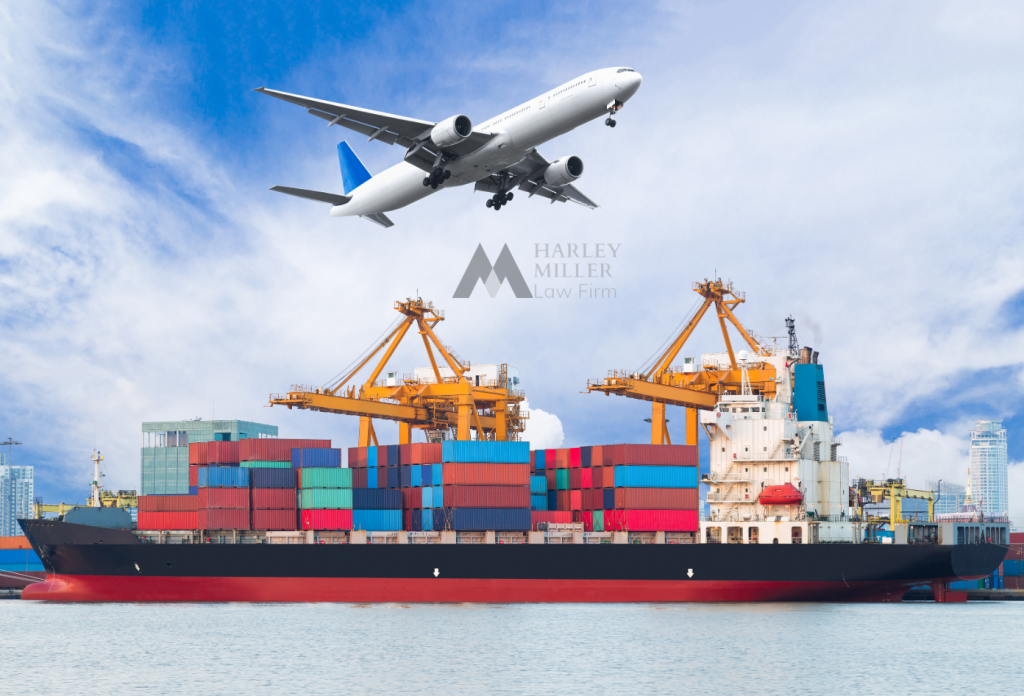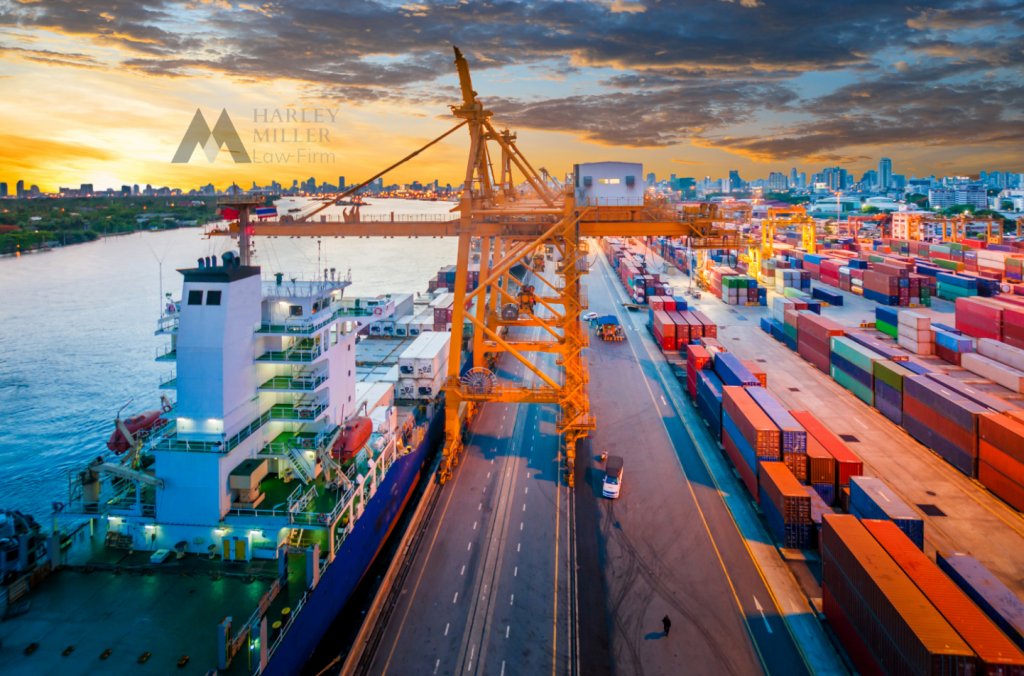Vietnam Logistics market is ranked 10th in the group of 50 emerging markets globally (Agility Ranking 2023). This is a good sign for the logistics market in Vietnam. Vietnam is expected to become Asia’s “logistics star” in the near future, this is a great opportunity for the logistics business community and related fields to approach solutions and promote cooperation to optimize logistics process, goods circulation.
Understanding Vietnam’s Logistics Market
In Brief
Logistics is one of the fastest growing and most stable industries in Vietnam, with an average growth rate of 14 – 16% a year, with a scale of 40 – 42 billion USD/year. Currently, with the development of global science and technology, businesses providing forwarding and transportation services are also active in digital transformation and applying high technologies to their daily work. This is a very good signal for the Vietnamese market. At the same time, since the Covid-19 epidemic, people are gradually getting used to online shopping, so people’s demand has increased. Grasping this, logistics enterprises also actively improve and transform to meet people’s needs, improve their quality and competitiveness.
Typically in the development of forwarding and delivery activities, last mile delivery is growing thanks to the explosion of e-commerce. According to the General Report, the scale of Vietnam’s e-commerce is estimated at over 14 billion USD. The average growth rate of e-commerce in the period 2020-2025 is forecasted to be 29% and by 2025 it will reach US$52 billion, ranking third in the ASEAN region. The VIRAC report shows that more than 60% of global retail professionals expect e-commerce penetration to reach at least 20% of total retail sales. This proportion will continue to increase in the retail segment and is expected to grow exponentially in the coming years.
(Reference data at VIRAC on 06/26/2023)
Limitations that need to be overcome
However, Vietnam’s logistics industry still has many weaknesses such as: The costs are still high; lack of linkage between logistics service enterprises with each other and with production, trading and import-export enterprises; the scale and financial potential of Vietnamese logistics enterprises are still weak, the going to foreign markets is not significant…
Besides, activities in Vietnam are greatly affected by cost and infrastructure factors. Weak infrastructure that has not met the development needs of logistics will be a threat to the expansion of the forwarding and express delivery market. Delivery and delivery are there, but letting it happen fast or slow depends a lot on traffic factors, warehouses, etc.
Another difficulty of businesses when they want to participate in forwarding or express delivery is the high level of competition. Currently, the delivery market has about 800 businesses participating. Therefore, in order to attract and retain customers, businesses need to make efforts to find ways to reduce delivery time, increase shipping speed and more competitive prices.

New technology – a factor to improve the capacity of goods management and circulation
Advances in technology affect all activities in immeasurable ways; particularly in the field of logistics new technologies are rapidly changing the way businesses do business.
With consumer demand for faster, cheaper and more flexible shipping, it’s more important than ever to keep up with the developments that shape today’s industry. In the face of a growing wave of online shopping, investment and application of logistics technology is considered a solution to help businesses meet the increasing demand for transportation and bring more conveniences to consumers in the future.
Notable companies with new technology include: AFR Solutions – the leading cloud computing solution, supply chain and trade management; AHAMOVE – OnWheel, professional delivery management software; SAMSUNG SDS – 4PL service based on integrated logistics platform Cello… ECOTRUCK – a company that applies technology in management and operation, focusing on large commodity segment with an ecosystem of complementary services for for transportation such as petrol, tires, insurance, repair, financial support for car purchase, transportation cash flow, parking… to help optimize operations, cut costs and bring efficiency and more value for businesses and transport partners effectiveness.
Must-have skills for people working in the logistics industry
For businesses that are intending to work in this industry, it is necessary to have and master certain operations. However, in any position, you still need to understand some basic concepts:
+ Incoterms;
+ Set of import and export documents;
+ Cargo insurance;
+ Vnaccs Customs Declaration;
+ Goods delivery procedures;
+ HS code, tax calculation, specialized test.
In addition to the above knowledge, to do well in the industry, you still need some skills such as:
+ The ability to see the big picture in this industry. At the same time, anticipate the risks that may arise during the operation and come up with a reasonable contingency plan.
+ The ability to adapt to changes in the supply chain, especially as the logistics industry grows, the greater the fluctuation in services.
+ Being calm under pressure will help you easily integrate and avoid risks when working.
Be honest with customers, especially when problems arise. Instead of hiding, you should talk frankly with the customer to come up with the most suitable solution.

Market trends and challenges
Cold chain logistics
a. Overview
Cold chain logistics in Vietnam is in its early stages of development but holds significant growth potential, especially in the food and pharmaceutical sectors.
Inadequate infrastructure, a lack of regulatory standards, and a shortage of skilled workers are challenges within Vietnam’s cold chain industry. To address these challenges, cold chain providers must invest in the required technology and infrastructure to improve operational efficiency and cost-effectiveness.
Cold chain logistics providers in Vietnam have a lucrative opportunity in the e-commerce market. As more consumers purchase fresh and frozen food products through online platforms, collaboration between cold chain logistics providers and e-commerce platforms becomes essential. Working together, they can develop innovative solutions to meet the evolving demands of customers. Additionally, fostering the growth of the cold chain logistics industry requires collaboration between the public and private sectors.
b. Benefits
– Extend the shelf life or use value and reduce the rate of deterioration of goods that need to be refrigerated.
– Enhance customer experiences and create loyalty
All customers who manufacture and trade goods that require refrigeration and maintenance at a stable temperature wish for the following:
+ They require the cold storage systems, refrigerated trucks, or chain links in cold chain logistics to always be in a good technical state. They expect these to managed and closely monitored scientifically, with technical and technological solutions.
+ It is possible to search, check and compare all issues related to their goods during the contractor’s service provision such as: location of goods, equipment and vehicles, refrigeration technical condition of the contractor. cold storage, vehicles and equipment. Condition of goods (volume, quality, time, delivery procedures, etc.) in and out of warehouse.
The reduction in defective products indicates that we have significantly reduced the rate of defective orders, and the supply chain continually plays a role in improving customer satisfaction.
– Improve the quality of life, open up opportunities for cooperation
Preservation activities in cold chain conditions maintain the quality of goods, ensuring freshness, physical properties, and nutritional composition, and strictly controlling and reducing the quantity of lost and worn products to the lowest possible level. As a result, the quantity of goods supplied to the domestic market as well as exported to always satisfy high standards and strict regulations on food hygiene and safety, nutrition and physical and chemical components. of the product. Therefore, they have contributed to best meet the needs and high standards of domestic and foreign consumers.

Green logistics development
a. Overview
As consumers prefer environmentally friendly products and the global transition to a green economy takes place, firms are showing a growing interest and making professional investments in green logistics. Green logistics is currently an important link in creating a green supply chain towards a sustainable development roadmap.
Green logistics plays an important role in ensuring efficient and sustainable transportation of food products in the food industry in Vietnam, while minimizing negative impacts on the environment. The application of green logistics solutions, such as green transportation, green packaging, green warehousing, and green logistics data management, helps firms meet environmental criteria, improve competitiveness, and achieve sustainable growth in various fields.
b. Benefits
– Reduce transportationg costs and increase efficiency in the supply chain:
By optimising delivery routes and reducing the number of empty or half-loaded trucks on the road, which can help firms save fuel and transportation costs besides reducing traffic congestion and pollution
– Environmental protection:
Green logistics aims to minimize the environmental impact of transportation and logistics activities. By developing green logistics in Vietnam, the country can reduce greenhouse gas emissions, air pollution, and noise pollution, leading to a cleaner and healthier environment.
– Improved public health:
Reduction in air pollution and greenhouse gas emissions can have a positive impact on public health. By reducing the use of fossil fuels and implementing sustainable practices, green logistics can help reduce respiratory problems and related health issues in Vietnam.
– Enhanced urban planning:
Developing this Vietnam would require infrastructure improvements and better urban planning. This can lead to more organized traffic flow, reduced congestion, and efficient use of resources, resulting in better living conditions for urban residents.
– Meeting international standards and regulations:
Many countries and international organizations have set emissions standards and regulations for logistics activities. Developing green logistics in Vietnam would help the country comply with these standards, ensuring smooth international trade and avoiding trade barriers related to environmental concerns.
– Sustainable future:
By embracing green logistics practices, Vietnam can contribute to sustainable development and create a more sustainable future for generations to come. This can help preserve natural resources, protect biodiversity, and mitigate the effects of climate change.

It is necessary to promote digital transformation in the logistics market and develop e-logistics
At the present time, digital transformation is an inevitable part of all economic sectors, including logistics. Digital transformation will help this activities take place smoothly, quickly and save labor. Therefore, for sustainable development, a very important thing that businesses must do is digital transformation, using data in their operations.
Today, when e-commerce develops, e-logistics is born. E-logistics, or electronic logistics, or electric logistics, is a form of digitally transformed logistics that serves the e-commerce industry. In essence, e-logistics is a logistics activity that applies digital technologies to be compatible with the exchange and purchase activities of businesses and buyers in e-commerce, and at the same time accelerate the post-production process. needed for these activities.
E-logistics is a relatively new concept in Vietnam, although in fact, many businesses are applying and applying e-logistics quite successfully. To achieve as expected: to become the logistics center of the region and the world, logistics enterprises need to promote the application of e-logistics to their business models. However, many businesses have not found a way or are still struggling to apply e-logistics to their businesses.
Conclusion
As Vietnam’s economy continues to thrive, an efficient and robust logistics network becomes more essential than ever. Currently, Vietnam’s logistics enterprises have a great advantage that Vietnam’s domestic and international production and trade activities have grown continuously in recent times.
HMLF is always available to offer assistance in understanding the procedures with authorities.

Harley Miller Law Firm “HMLF”
Head office: 14th floor, HM Town building, 412 Nguyen Thi Minh Khai, Ward 05, District 3, Ho Chi Minh City.
Phone number: +84 937215585
Website: hmlf.vn Email: miller@hmlf.vn


